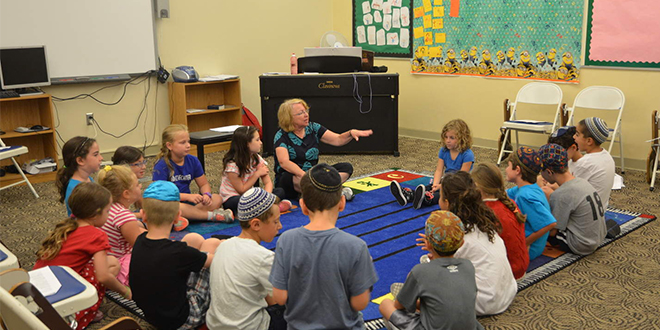04/11/2016
Music for the Soul
- Share This Story

by Rory Sanders, Gross Schechter Day School Music Teacher K-8
Music accesses the part of ourselves that is soul-worthy. To reach the "specialness" that each of us represents, we sing, emote and dance rhythmically to express melody and the beat. We can connect through song in a way that transcends differences, which is one of the reasons music is so powerful.
The way I lead my music classes calls on my masters in elementary education, my years spent as a cantorial soloist and community theater music director. The musical components make themselves known throughout the sessions: new songs to explore, creative rhythms to beat, Hebrew standards and recent compositions, secular and seasonal music, orchestral instruments and significant composers.
As research has demonstrated, music has cognitive effects on our brains and bodies. Here are just a few proven benefits of incorporating music into our daily lives, which comes into play as I teach my classes.
- Music training can significantly improve our motor and reasoning skills. One study showed that children who had three years or more musical instrument training performed better than those who didn’t learn an instrument in auditory discrimination abilities and fine motor skills. They also tested better on vocabulary and nonverbal reasoning skills, which involve understanding and analyzing visual information, such as identifying relationships, similarities and differences between shapes and patterns.
- Music aids language development. According to the Children’s Music Workshop, the effect of music education on language development can be seen in the brain. “Recent studies have clearly indicated that musical training physically develops the part of the left side of the brain known to be involved with processing language, and can actually wire the brain’s circuits in specific ways. Linking familiar songs to new information can also help imprint information on young minds,” the group claims.
- The Brain Works Harder. Research indicates the brain of a musician, even a young one, works differently than that of a non-musician. “There’s some good neuroscience research that children involved in music have larger growth of neural activity than people not in music training. When you’re a musician and you’re playing an instrument, you have to be using more of your brain,” says Dr. Eric Rasmussen, chair of the Early Childhood Music Department at the Peabody Preparatory of The Johns Hopkins University, where he teaches a specialized music curriculum for children aged two months to nine years.
- Music improves spatial-temporal skills. Research has also found a causal link between music and spatial intelligence, which means that understanding music can help children visualize various elements that should go together, like they would do when solving a math problem.
- Music Study improves test scores. A study published in 2007 by Christopher Johnson, professor of music education and music therapy at the University of Kansas, revealed that students in elementary schools with superior music education programs scored around 22 percent higher in English and 20 percent higher in math scores on standardized tests, compared to schools with low-quality music programs, regardless of socioeconomic disparities among the schools or school districts.
My fast-paced class begs for active student participation in an atmosphere of joy. Hopefully your children have come home singing melodies and exploring rhythms from our class. We can already see the short-term benefits of the music program. Last week, students spontaneously burst into song during lunch time, which was heard throughout the school. As I entered the merkaz, they were all huddled together, arms around one another, singing at the top of their lungs. Feeling that connective power was incredible and I am proud that both the short and long-term benefits will have a lasting impact on our students.
Sources: http://www.pbs.org/parents/education/music-arts/the-benefits-of-music-education/
http://www.plosone.org/article/info%3Adoi%2F10.1371%2Fjournal.pone.0003566

